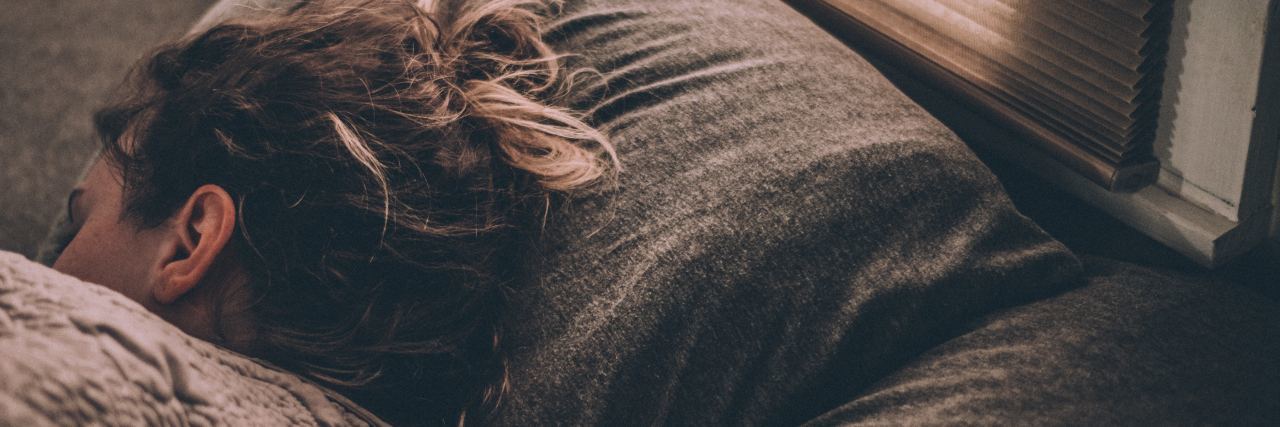One of my favorite Mighty articles is a piece by Olivia James entitled What It Feels Like to Have Chronic Depression Fatigue. Before reading her story, I had never had a name for my propensity – albeit unfortunate – to sleep between 12-20 hours a day. Nor for the sheer, unshakable exhaustion I feel in almost every waking hour. Unlike physical or mental exhaustion from a long day or strenuous schedule, this chronic depression fatigue so aptly named in James’ writing is a sort of emotional bankruptcy, physical fatigue, and depression-induced debility all in one… It’s feeling like you can’t keep your eyes open no matter how much or how little sleep you get – for months on end. It’s falling asleep sitting up at 12 p.m., waking up four hours later, and planning your day around the five-minute nap you’ll get in the car between shifts. It’s looking forward to being in bed and literally nothing else.
Needless to say, depression fatigue is… exhausting, and particularly frustrating when you want nothing more than to be your active, engaged, hyper-motivated self. While three years ago I was writing a 200-page undergraduate thesis, dancing up to 10 hours a day, writing articles between classes, developing programming, and traveling across the country for teaching workshops, I now find myself in a state of near constant distress. I’m barely eating, surviving off cheese sticks and applesauce, working as little as I possibly can to survive, and sleeping through almost every hour I have at my disposal.
Yet when I surrender to the frustration and sadness, expressing discouragement about my constant exhaustion and consequent sleep habits to friends, it’s very infrequently received with anything but exasperation, resentfulness, and… jealousy. Just this past week, I confided in a friend the hours I spent sleeping through what otherwise would have been a great day off, only to be cut off with a dismissive laugh: “You’re so lucky,” they said, then went on to list a grueling schedule and all the work they accomplished. For those of us who have depression fatigue, action steps such as psychiatry, therapy, exercise (when we can muster it), and good nutrition (when we have the energy) can help with the symptoms, but one thing that doesn’t help is the insinuation that our sleeping through life – even though many of us would do anything not to – is somehow enviable. We walk away from interactions like these feeling not just invalidated, but ashamed, patronized, and even more exhausted than before. Here’s why:
It makes us feel accused of laziness.
For many of us who have chronic depression alongside perfectionism and high functioning anxiety, we often cycle through a series of self-deprecating mantras (“you’re lazy,” “you don’t do enough,” “you’re not good enough”) regardless of how much we accomplish and no matter how objectively untrue they are. Implying that the amount of sleep we get on a given day is merely a choice made amidst mass amounts of leisure time is neither a fair assumption of work ethic, nor is it reflective of the complexity that is mental illness. I promise we’re not lazy; our personal and professional work histories very often reflect that. For myself and so many others, this is something more.
It’s uninformed.
The ability to sleep upwards of 20 hours a day for extended periods of time is not physically natural. The amount of exhaustion and sleep those of us with depression fatigue often face is medically atypical and – as my doctor explained to me recently – unless you have a chronic illness, the body simply won’t stay unconscious for that long on a regular basis. If it does, the risk of cognitive impairment, obesity, heart disease, stroke, and all-cause mortality increase as a result oversleeping. From a clinical standpoint, hypersomnia is not enviable.
It makes us feel misunderstood.
Believe it or not, most of us don’t want to sleep life away. It’s not fun. Actually, it’s, not even restful. Sleep from depression fatigue is anxiety-ridden and unsought. Yes, sleeping for long periods during the day means we get to temporarily avoid doing things we otherwise may not enjoy (i.e. cleaning, cooking, doing the laundry, etc.), but it also means we end up missing out on the parts of life we want to be engaged in. What I wouldn’t give to have a day of energy! I want to clean, cook, go out with friends, and work long hours instead of falling into an exhausted stupor. I love the grind of life, goal setting, and staying busy… just not when I’m in a major depression.
“You’re lucky” is just a more passive way of saying “it could be worse.”
Numerous articles have been written on the “it could be worse” response, but to break it down, telling someone with a mental illness that it could be worse is like telling someone with their pants on fire that it could be worse… Of course it could be worse! It can always be worse. Their shirt could be on fire, too. But telling them so while they’re on fire does not negate the pain or mitigate the issue in any way – it merely leaves them in flames with the additional burdens of invalidation, shame, and guilt. “You’re lucky” is an “it could be worse” equivalent; it doesn’t help and further stigmatizes.
To someone else, a two-hour nap may be a luxury, but to those with depression fatigue and depression-induced hypersomnia, sleep has become a burden to bear that luck has nothing to do with. So instead of reminding us why we shouldn’t feel the way we do, I ask you instead to listen. Just listen. Sometimes… most of the time, that’s all we need.
Photo courtesy of Unsplash

